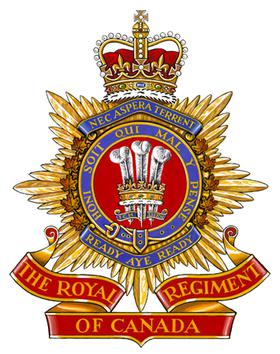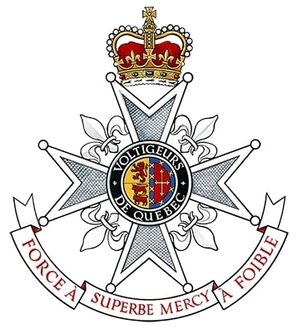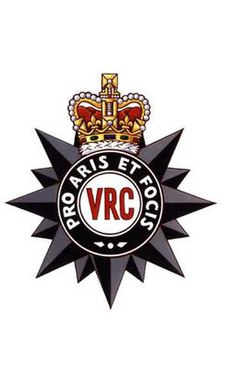
Les Fusiliers Mont-Royal is a Primary Reserve infantry regiment of the Canadian Army.

The Royal Regiment of Canada is a Primary Reserve infantry regiment of the Canadian Army. The regiment is based in Toronto, Ontario, and forms part of the 4th Canadian Division's 32 Canadian Brigade Group.

The 12e Régiment blindé du Canada is a Canadian Army armoured regiment based in CFB Valcartier, on the outskirts of Quebec City. The regiment has both a Regular Force and a Primary Reserve unit. The 12e Régiment blindé du Canada's abbreviation is 12e RBC.

The Canadian Grenadier Guards (CGG) is a reserve infantry regiment in the 34 Canadian Brigade Group, 2nd Canadian Division, of the Canadian Army. The regiment is the oldest and second-most-senior infantry regiment in the Primary Reserve of the Canadian Army. Located in Montreal, its main role is the provision of combat-ready light infantry troops in support of Canadian regular infantry. It is a Household Foot Guard regiment and also provides soldiers for public ceremonial duties, performing similar ceremonial duties as the Guards regiments of the British Army. This primarily entails mounting the guard at Government House, the King's and Governor General's residence, and performing the "Changing the Guard" ceremony on Parliament Hill in Ottawa, a task it shares with Canada's senior Household Foot Guard regiment, the Governor General's Foot Guards of Ottawa. The Canadian Grenadier Guards is an allied regiment to the British Grenadier Guards.

The Royal Hamilton Light Infantry (Wentworth Regiment) (RHLI) is a Primary Reserve infantry regiment of the Canadian Army, based at John Weir Foote VC Armoury in Hamilton, Ontario. The RHLI is part of 31 Canadian Brigade Group, which is part of 4th Canadian Division.

The Black Watch of Canada is a reserve infantry regiment in 34 Canadian Brigade Group, 2nd Canadian Division, of the Canadian Army. The regiment is located at 2067, rue Bleury in Montreal, Quebec, Canada, and is currently commanded by Lieutenant-Colonel R.M. Unger, MMM,CD. The regiment's armoury was designated a National Historic Site of Canada in 2008. They are the senior Canadian-Scottish Regiment.

Les Voltigeurs de Québec is a Primary Reserve infantry regiment of the Canadian Forces. It is at the Quebec City Armoury in Quebec City, Quebec, Canada. The name of the regiment commemorates another older French-speaking Canadian militia light infantry unit, the Canadian Voltigeurs. The founder of the Canadian Voltigeurs, Lieutenant-Colonel Charles-Michel d'Irumberry de Salaberry, was the father of the two men who raised Les Voltigeurs de Québec. The regiment was formed in March 1862, with its headquarters in Quebec City, by the amalgamation into a regiment of eight independent volunteer militia rifle companies. The first of these companies was originally raised in December 1861. Between 1862 and 1867 these companies were frequently disbanded, reformed and renumbered. In 1942 it provided an armoured regiment.

The Brockville Rifles is a Primary Reserve infantry regiment of the Canadian Army. The unit is a part of the 33 Canadian Brigade Group, 4th Canadian Division. It is fifteenth in the order of precedence of Canadian Army Infantry Regiments.

The North Saskatchewan Regiment is a Primary Reserve infantry regiment of the Canadian Army, headquartered in Saskatoon, Saskatchewan, with companies in Saskatoon and Prince Albert. Its current commanding officer is Lieutenant-Colonel Mike Graver, and the Regimental Sergeant-Major is Chief Warrant Officer Jason Balcaen. The N Sask R is part of the 3rd Canadian Division's 38 Canadian Brigade Group, with the regiment's mission task as of 2024 being to provide direct fire support.

The Royal Montreal Regiment is a Primary Reserve infantry regiment of the Canadian Army based in Westmount, Quebec. It is part of the 2nd Canadian Division's 34 Canadian Brigade Group.

The Royal Regina Rifles is a Primary Reserve infantry regiment of the Canadian Army. Prior to 1982 the regiment was known as The Regina Rifle Regiment. The Royal Regina Rifles are part of 3rd Canadian Division's 38 Canadian Brigade Group.

The Saskatchewan Dragoons is a Primary Reserve armoured regiment of the Canadian Army. The unit is based in Moose Jaw. Their primary job is to assist the Regular Force in meeting Canada's military commitments. Their training and equipment closely follow that of the Regular Force, which the Reserves are called upon to assist increasingly often. The Saskatchewan Dragoons are part of 3rd Canadian Division's 38 Canadian Brigade Group.

The Royal Rifles of Canada was a rifle regiment in the Canadian Army and fought alongside The Winnipeg Grenadiers in the Battle of Hong Kong during World War II. In November 1966, it was reduced to nil strength and placed on the Supplementary Order of Battle.
The Canadian Fusiliers (City of London Regiment) was an infantry regiment of the Non-Permanent Active Militia of the Canadian Militia (now the Canadian Army). In 1954, the regiment was amalgamated with The Oxford Rifles to form The London and Oxford Fusiliers (now the reserve battalion of the Royal Canadian Regiment).
The Oxford Rifles were an infantry regiment of the Non-Permanent Active Militia of the Canadian Militia. In 1954, the regiment was amalgamated with The Canadian Fusiliers to form The London and Oxford Fusiliers.
The Victoria and Haliburton Regiment was an infantry regiment of the Non-Permanent Active Militia of the Canadian Militia. In 1936, the regiment was converted from infantry to artillery to become the 45th Field Battery RCA and now forms part of the 50th Field Artillery Regiment, RCA.
The Haldimand Rifles was an infantry regiment of the Non-Permanent Active Militia of the Canadian Militia. In 1936, the regiment was Amalgamated with The Dufferin Rifles of Canada to form The Dufferin and Haldimand Rifles of Canada.
The Dufferin and Haldimand Rifles of Canada was an infantry regiment of the Non-Permanent Active Militia of the Canadian Militia and later the Canadian Army. The regiment was formed in 1936, when The Haldimand Rifles was Amalgamated with The Dufferin Rifles of Canada. In 1946, the regiment was converted from Infantry to Artillery and now forms part of the 56th Field Artillery Regiment, RCA.
The Dufferin Rifles of Canada was an infantry regiment of the Canadian Non-Permanent Active Militia 1866-1936.
The South Saskatchewan Regiment was a short-lived infantry regiment of the Non-Permanent Active Militia of the Canadian Militia. In 1924, the regiment was reorganized and split up into 5 separate regiments.


















